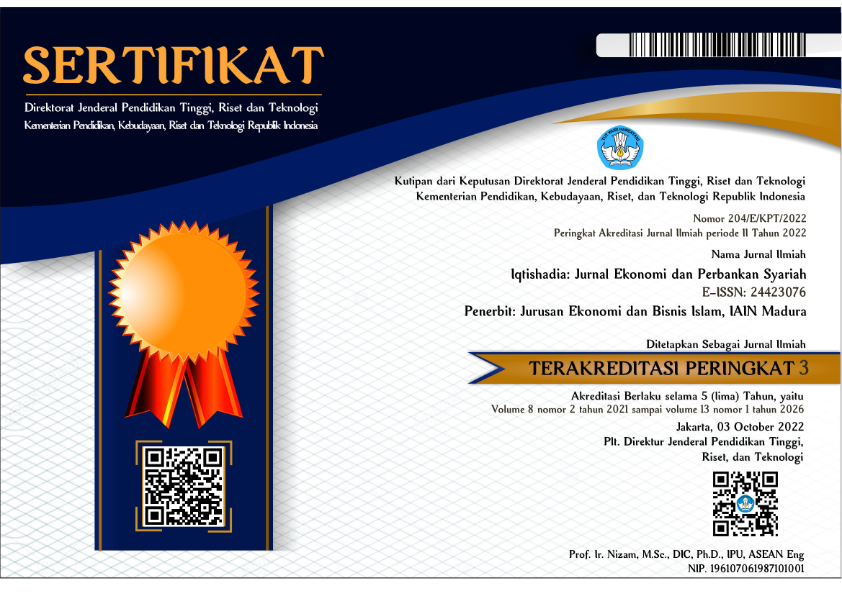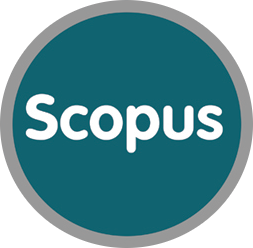Pengelolaan Pariwisata Halal Pekalongan Studi Peran Pedagang Kuliner dan Kesejahteraan Masyarakat
 Abstract views: 1171
,
Abstract views: 1171
,
 PDF downloads: 981
PDF downloads: 981
Abstract
Downloads
References
Angga, P. W. (2020). Kampung Batik Kemplong Wiradesa. Retrieved February 17, 2020, from Cinta Pekalongan website: https://www.cintapekalongan.com/kampung-batik-kemplong-wiradesa/
Ansharullah, A., Natasha, H., & Indra, A. M. (2018). Pemberdayaan Pelaku Ekonomi Sektor Melalui Peningkatan Pemahaman Konsep Wisata Syariah. Jurnal Pemberdayaan Masyarakat Madani, 2(2), 224–236.
Antara, M., & Sumarniasih, M. S. (2017). Role of Tourism in Economy of Bali and Indonesia. Journal of Tourism and Hospitality Management, 5(2), 34–44. https://doi.org/10.15640/jthm.v5n2a4
Aziz, A. (2008). Peran serta masyarakat dalam upaya pengembangan ekowisata di kabupaten pekalongan. Universitas Sebelas Maret Surakarta.
Battour, M., Ismail, M. N., & Battor, M. (2011). The Impact of Destination Attributes on Muslim Tourist ’ s Choice. INTERNATIONAL JOURNAL OF TOURISM RESEARCH, 540(December 2010), 527–540. https://doi.org/10.1002/jtr.824
Battour, M. M., Ismail, M. N., & Battor, M. (2010). Toward a Halal Tourism Market. Tourism Analysis, 15(4), 461–470. https://doi.org/10.3727/108354210X12864727453304
Bungin, B. (2011). Penelitian Kualitatif: Komunikasi, Ekonomi, Kebijakan Publik, Dan Ilmu Sosial Lainnya. In Kencana. https://doi.org/10.1002/jcc.21776
Chok, S., Macbeth, J., & Warren, C. (2007). Tourism as a tool for poverty alleviation: A critical analysis of “pro-poor tourism” and implications for sustainability. Current Issues in Tourism, 10(2–3), 144–165. https://doi.org/10.2167/cit303
Choudhury, M. A. (2010). The Dynamics of The Shari ’ ah and The World-System. Regulators Forum Global Islamic Finance Forum: Special Session on Islamic Finance and Financial Stability Report, 23(October), 201–227.
Cooper, C., & Hall, C. M. (2007). Contemporary Tourism: An International Approach. In Contemporary Tourism: An International Approach. https://doi.org/10.4324/9780080554990
Croes, R., & Rivera, M. (2016). Poverty Alleviation through Tourism Development: A Comprehensive and Integrated Approach. Retrieved from http://www.taylorandfrancis.com
Darmawan, B. (2020). 11 Tujuan Ekonomi Syariah. Retrieved February 20, 2020, from Ekonomi Islam.com website: https://ekonomi-islam.com/tujuan-ekonomi-syariah/
Dinporapar Kabupaten Pekalongan. (2020). Objek Wisata. Retrieved February 17, 2020, from Dinporapar Kabupaten Pekalongan website: https://www.dinporapar-pekalongankab.web.id/index.php/view/artikel/objek_wisata
Dredge, D., & Gyimothy, S. (2016). Collaborative Economy and Tourism. Springer.
E Azam, M. S., Abdullah, M. A., & Razak, D. A. (2019). Halal tourism: definition, justification, and scopes towards sustainable development. International Journal of Business, Economics and Law, 18(3), 23–31.
Fajriah, S. D., & -, M. (2014). Pengembangan Sarana dan Prasarana untuk Mendukung Pariwisata Pantai yang Berkelanjutan (Studi Kasus: Kawasan Pesisir Pantai Wonokerto Kabupaten Pekalongan). JURNAL PEMBANGUNAN WILAYAH & KOTA. https://doi.org/10.14710/pwk.v10i2.7653
Fanani, Z., & Pangestuti, E. (2017). Analisis Keamanan dan Kenyamanan Objek Wisata Penanjakan 1 Bromo. Jurnal Administrasi Bisnis, 49(2), 63–67.
Ghanbari, M., & tamaj, Y. R. (2018). Iran`s Islamic and Halal tourism development challenges. In M. Kozak & N. Kozak (Eds.), 10 th World Conference for Graduate Research in Tourism Hospitality and Leisure 6 th Interdisciplinary Tourism Research Conference (pp. 194–199). Ankara: Anatolia: An International Journal of Tourism and Hospitality Research.
Indonesia, C. (2019). Indonesia Peringkat Pertama Wisata Halal Terpopuler Dunia. Retrieved from Indonesia, CNN website: https://www.cnnindonesia.com/gaya-hidup/20190409145715-269-384592/indonesia-peringkat-pertama-wisata-halal-terpopuler-dunia
Irma, A., & Yani, F. (2019). The Development Of Islamic Economics Based On Halal Tourism In Indonesia. Proceeding International Seminar on Islamic Studies, 1(1), 956–966.
Jaelani, A. (2017). Halal tourism industry in Indonesia: Potential and Prospects. Munich Personal RePEc, 1–20.
Komalasari, I. (2017). Upaya Indonesia Meningkatkan Daya Saing Muslim Friendly Tourism (MFT) Diantara Negara-negara OKI. JOM FISIP, 4(2), 1–12.
Kurniawan, W. (2015). Dampak Sosial Ekonomi Pembangunan Pariwisata Umbul Sidomukti Kecamatan Bandungan Kabupaten Semarang. Economics Development Analysis Journal, 4(4), 443–451. https://doi.org/10.15294/edaj.v4i4.14851.
Mannan, M. A. (1982). WHY IS ISLAMIC ECONOMICS IMPORTANT? Jeddah - Saudi Arabia.
Nawawi, H. (1998). Metode Penelitian Bidang Sosial. Yogyakarta: Gajah Mada University Press.
Nugroho, L., Utami, W., & Doktoralina, C. M. (2019). Ekosistem Bisnis Wisata Halal dalam Perspektif Maqasid Syariah (Halal Tourism Business Ecosystem in the Maqasid Syariah Perspective). Islamic Banking and Finance Journal, 3(2), 84–92. https://doi.org/10.21070/perisai.v3i2.1964
Pekalongan, O. D. K. (2017). Jumlah Kunjungan Wisata Alam Pantai Depok. Retrieved February 12, 2020, from Kabupaten Pekalongan website: http://data.pekalongankab.go.id/dataset/jumlah-kunjungan-wisata-alam-pantai-depok/resource/e6c95f63-72bf-4ab9-a848-3001068f0d55
Pemerintah Kabupaten Pekalongan. (2020). Lambang dan Motto Daerah Kabupaten Pekalongan. Retrieved February 17, 2020, from http://pekalongankab.go.id/v2/pemerintahan/profil/lambang-moto
Qibthiyyah, R. M. (2018). Kajian Dampak Sektor Pariwisata Terhadap Perekonomian Indonesia.
Qodriyatun, S. N. (2018). Implementasi Kebijakan Pengembangan Pariwisata Berkelanjutan di Karimunjawa. Aspirasi: Jurnal Masalah-Masalah Sosial, 9(2), 240. Retrieved from http://jurnal.dpr.go.id/index.php/aspirasi/index
Riskiyah, N. (2019). Kajian Pengembangan Objek Wisata Pantai Depok Terhadap Pendapatan Asli Daerah. Retrieved February 12, 2020, from Jurnal Ilmiah Geografi website: https://adoc.tips/kajian-pengembangan-objek-wisata-pantai-depok-terhadap-penda.html
Ropiah, E. S. (2018). Wisata Halal: Potensi Ekonomi Baru Industri Pariwisata di Kabupaten Cirebon. INKLUSIF, 3(2), 166–183.
Samori, Z., Md Salleh, N. Z., & Khalid, M. M. (2015). Current trends on Halal tourism: Cases on selected Asian countries. Tourism Management Perspectives, 19, 131–136. https://doi.org/10.1016/j.tmp.2015.12.011
Satriana, E. D., & Faridah, H. D. (2018). Wisata Halal: Perkembangan, Peluang, dan Tantangan. Journal of Halal Product and Research, 01(02), 32–43.
Sondakh, P. (2016). Pelayanan, Keamanan dan Daya Tarik Mempengaruhi Minat Wisatawan yang Berkunjung ke Objek Wisata Alam Gunung Mahawu, Tomohon. Jurnal Berkala Ilmiah Efisiensi, 16(1). Retrieved from ejournal.unsrat.ac.id
Surya, E. D. (2018). Analisis Pemasaran Pariwisata Halal di Propinsi Sumatera Barat. Universita Sumatera Utara.
Tambunan, T. T. H. (2019). Pembangunan Ekonomi Perdesaan. Bandung: CV. Pustaka Setia.
Turanhgil, F. G. (2016). Alternative Tourism in Turkey Role, Potential Development and Sustainability. GeoJournal Library 121 I, 121. Retrieved from http://www.springer.com/series/6007
Wakhidah, K., Dewi, S., & Ristianti, N. (2013). Bentuk Pengembangan Pariwisata Pesisir Berkelanjutan Di Kabupaten Pekalongan. Ruang: Jurnal Perencanaan Wilayah Dan Kota, 1(2), 261–270.
Widagdyo, K. G. (2015). Analisis Pasar Pariwisata Halal Indonesia. The Journal of Tauhidinomics, 1(1), 73–80.
Widhasti, G. B., Damayanti, C., & Sardjono, H. S. (2017). Diplomasi Publik Pemerintah RI Melalui Pariwisata Halal.
Zaini, M. (2019). Pengembangan Pariwisata Halal Berbasis Masyarakat untuk Meningkatkan Kesejahteraan (Vol. 53). https://doi.org/10.1017/CBO9781107415324.004.
The journal operates an Open Access policy under a Creative Commons Non-Commercial Share-Alike license. All articles published Open Access will be immediately and permanently free for everyone to read and download.
• Creative Commons Attribution-NonCommercial (CC-BY-NC)

Iqtishadia: Jurnal Ekonomi dan Perbankan Syariah by http://ejournal.iainmadura.ac.id/index.php/iqtishadia is licensed under a Creative Commons Attribution-NonCommercial 4.0 International License.
Based on a work at http://ejournal.iainmadura.ac.id.


























